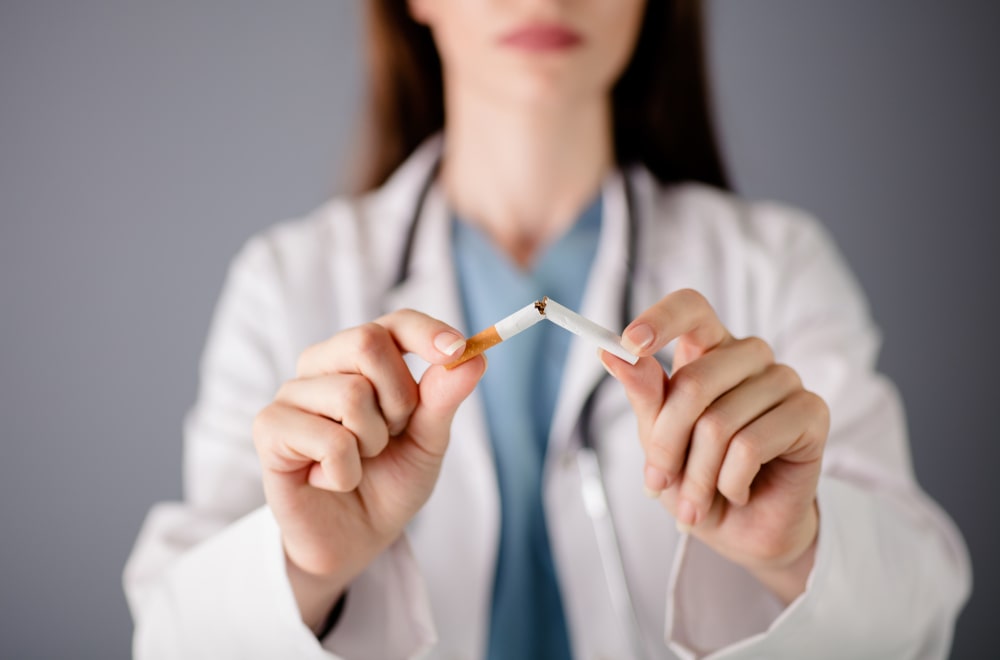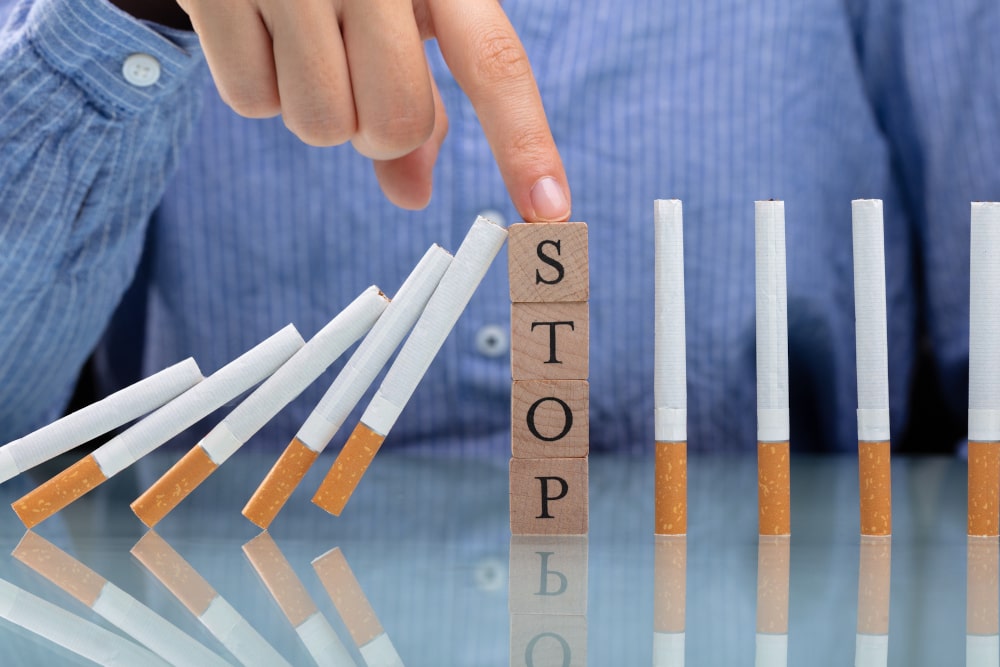
Key Takeaways
- Smoking before or after rhinoplasty significantly slows down healing and increases the risk of complications.
- Surgeons recommend quitting smoking at least 4 weeks before and after surgery.
- Nicotine restricts blood flow, reduces oxygen delivery, and can cause skin loss, scarring, infection, or poor cosmetic results.
- Even light smoking or vaping can compromise recovery and long-term outcomes.
- Always discuss your smoking history with your surgeon during the consultation.
Why Smoking After Rhinoplasty Is Dangerous
Smoking introduces toxins such as nicotine, carbon monoxide, and hydrogen cyanide, which constrict blood vessels and reduce oxygen levels in the bloodstream. Oxygen is critical for healing after any surgery — especially one involving delicate facial tissues.
When you smoke after rhinoplasty:
- Oxygen delivery to the surgical site drops.
- Tissue healing slows dramatically.
- The risk of infection, skin loss, or scarring increases.
Even vaping and nicotine patches can have similar adverse effects because nicotine itself restricts blood flow.
Typical Rhinoplasty Recovery Timeline
| Stage | Typical Recovery for Non-Smokers | If You Smoke |
|---|---|---|
| Week 1 | Splint removal, swelling and bruising peak. | Slower swelling reduction; risk of bleeding. |
| Week 2 | Most bruising subsides, and swelling decreases. | Prolonged bruising and inflammation. |
| Week 3–4 | Light cardio activities can resume. | You may still need rest; your skin may heal unevenly. |
| Week 6 | Bones are stable for complete workouts. | Possible delayed bone stabilization. |
| 3–6 Months | Numbness and sensitivity resolve. | Persistent numbness or stiffness is possible. |
| 1 Year | Complete healing achieved. | Final results may take longer or appear uneven. |
Significant smoking risks After Rhinoplasty
1. Slower or Improper Recovery
Nicotine narrows blood vessels, limiting the supply of oxygen and nutrients needed for healing. This can cause:
- Prolonged swelling and bruising
- Delayed wound closure
- Increased risk of infection or revision surgery
2. Skin and Tissue Loss
When oxygen levels drop, tissues can die (a condition called necrosis).
This can lead to skin loss around the nose, uneven healing, or visible irregularities in the final contour.
3. Increased Scarring
Smoking interferes with collagen formation — the key to smooth skin healing.
As a result, smokers are more likely to develop:
- Thicker, darker scars
- Irregular tissue texture
- Long-term discoloration
4. Breathing and Airway Issues
If your rhinoplasty involved septoplasty or other airway corrections, smoking can:
- Causes tissue inflammation and congestion
- Delay internal healing
- This leads to ongoing breathing difficulties.

5. Heart and Circulatory Complications
Nicotine and carbon monoxide increase blood pressure and heart rate.
After surgery, this can cause:
- Excessive bleeding
- Poor oxygenation of tissues
- Greater strain on the heart during recovery
6. Higher Infection Risk
Smoking weakens immune cells — especially neutrophils, which are essential for fighting infection.
This makes it harder for your body to defend against bacteria entering through surgical incisions.
What About Vaping or Nicotine Alternatives?
Many patients believe that vaping, e-cigarettes, or nicotine gum are safer options after rhinoplasty because they don’t contain tobacco smoke. Unfortunately, that’s a dangerous misconception.
Even without tobacco, these products still contain nicotine, which causes the same harmful effects on your healing tissues. Nicotine leads to vasoconstriction — a tightening of blood vessels — which limits blood flow and oxygen delivery to the surgical site. This can result in slower wound healing, prolonged swelling, and an increased risk of infection or tissue loss.
How Vaping Affects Rhinoplasty Recovery
Vaping liquids also contain propylene glycol, glycerin, and flavouring chemicals, which can irritate your nasal passages and throat. After surgery, this irritation can cause:
- Dryness or inflammation inside the nose
- Delayed healing of delicate internal tissues
- Increased mucus production or congestion
- Potential infection if the surgical site is exposed to contaminants in the vapour
When to Stop
Ideally, patients should stop all forms of nicotine at least 4 weeks before rhinoplasty and avoid restarting for at least 4–6 weeks after.
Tip: Ask your surgeon about a nicotine test before surgery — many clinics require patients to be completely nicotine-free for several weeks to ensure a safe, smooth recovery.

When Can You Safely Resume Smoking?
Ideally — never.
But if quitting permanently isn’t realistic, it’s crucial to delay smoking for as long as possible after your rhinoplasty.
Surgeons typically recommend waiting at least 4–6 weeks after surgery before smoking again. This waiting period allows your blood vessels, skin, and nasal tissues to regain enough strength to handle reduced oxygen levels. However, everyone heals at a different pace — your surgeon will need to confirm that both internal and external incisions have fully closed and that no swelling, scabbing, or tenderness remains.
Why This Waiting Period Matters
The first few weeks after rhinoplasty are when:
- New blood vessels form to nourish the healing tissues
- Scar tissue begins to mature and strengthen the surgical site.
- Inflammation decreases, reducing the risk of bleeding or infection.
If you reintroduce nicotine too early, these delicate healing stages can be disrupted — leading to poor cosmetic results, infection, or tissue breakdown. Even one cigarette can cause blood vessel constriction that lasts for hours, setting back your recovery progress.
What Happens If You Start Smoking Too Soon
Patients who resume smoking before complete healing may experience:
- Persistent swelling and discolouration
- Prolonged numbness or tingling around the nose
- Skin necrosis (loss of skin or tissue around incision sites)
- Weakened cartilage support, which may affect the nose’s final shape
The first few weeks after rhinoplasty are crucial. Smoking — even just one puff — can compromise all the effort and artistry that went into your surgery. Quitting, even temporarily, gives you the best chance for beautiful, lasting results.
Considering Rhinoplasty in Toronto?
If you’re a smoker or recently quit, Dr. Richard Rival and his team can guide you through the safest approach for your surgery and recovery.
Schedule a consultation at our Toronto or Newmarket office to discuss your options and create a personalized plan.